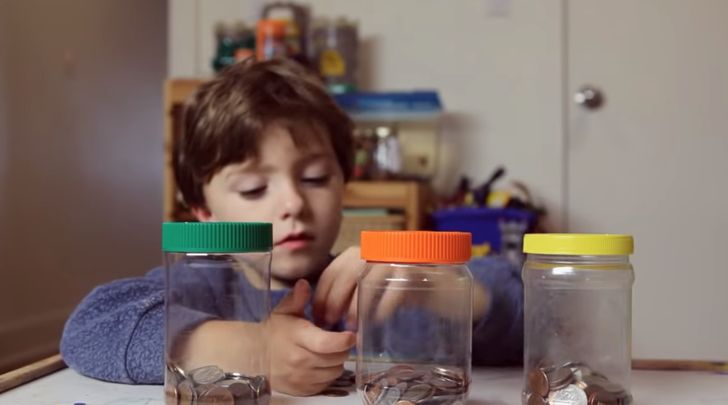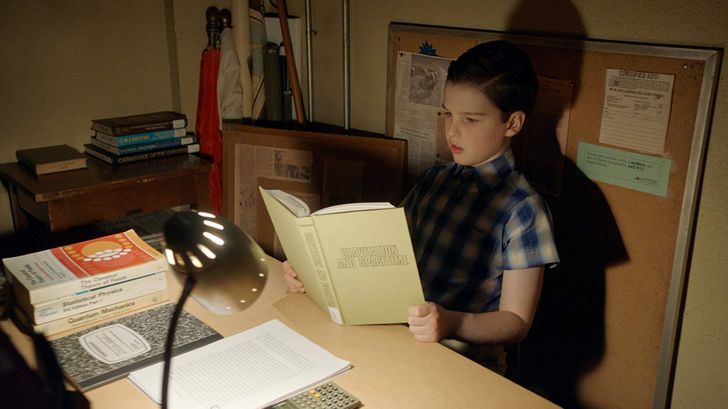If you don't have the money then be honest about it. I was lucky my dad had a good job but if I asked for something and my parents genuinely didn't have the money they said so. But children do ask for unreasonable things, they can't have everything!
10 Educational Tips That Can Help You Raise a Millionaire

Elon Musk, Larry Page, Mark Zuckerberg, and Oprah Winfrey — the world is full of stories of billionaires who started from scratch and achieved incredible success! Who wouldn’t hope, deep down in their heart, that their kid would become one of the most powerful people in the world? So, the question remains: how do you raise a person to be successful?
Bright Side looked all over the Internet for an answer and even though there’s no perfect solution, there are many techniques you can start using today to help your children become more prosperous tomorrow.
1. Talk to your children about money — it’s not something you can do, it’s something you should do.
This is not a taboo topic. From an early age, a child must know where money comes from, what it’s used for, and how one can earn it.
- In a store, try directing their attention to prices. The child will be happy to be an active part of the shopping process. They can choose something from your shopping list and tell you how much it costs. Then they’ll realize why, for example, toothpaste worth $5 stays on the shelf while a similar one that costs $1.20 goes into your cart.
- Explain what both you and your partner do at work, why you go to the office every day, and what a salary is.
- During dinner, talk about a long shopping day or a future vacation from a financial perspective.
2. Send your kid to do some errands.
You don’t need to let them go alone. You can stay close by and watch. Children aged between 7 to 9 years can efficiently perform these types of tasks. They can also ask for help if they’re younger and don’t know how to read properly yet.
- Make sure your child has the shopping list, knows the goal, and has the money.
- Their task is to pick the products on the list and try not to be distracted by temptation. They also need to calculate how much money is needed and pay the cashier.
- Of course, it’s better to start with something small. Don’t send your younger son or daughter to do a whole week’s worth of grocery shopping unless you want your family to dine on only chocolate for the next 7 days.
Montessori schools around the world practice this method of financial education. Students go to the store and buy products for the rest of their classmates, such as fruit for lunch or ingredients for baking bread later in the day.
For parents, this can be excellent training because they get to practice how to step aside and avoid the urge to help or correct their child. The task is completed successfully when the kid gets to do everything autonomously, without interference from adults.
3. Play games associated with the economy.
- “Monopoly” and “Cashflow” are great board games to play since its participants can quickly learn about investments, assets, liabilities, and taxes.
-
If you have small children, try playing “bank,” “store,” or any other game that illustrates to them how the financial world works.
-
Theme parks where kids pretend to be adults can help you raise this type of game to a new level. There, your little one can “work” as a cashier, bank manager, or lender, and earn money they can spend.
4. The theory of 3 piggy banks — the first step for setting a budget
Robert Kiyosaki, author of Rich Dad Poor Dad, and Mark Allen, author of The Millionaire Course, promote this concept in their books. Your child will need 3 or 4 piggy banks, each of which will save money for a different purpose.
- Savings: Progressively, people can save copious amounts of money to make their dreams come true. Plus, the habit of saving money is considered good practice for taking out future loans.
- Expenses: Not all adults know how to be patient and for some children, it’s even harder. This piggy bank will enable the kid to understand how rewarding it is to treat yourself with the money you’ve earned over time.
- Investments: Children don’t have many chances to create assets, but you can always ask your local bank for an account that will let them accumulate interest from their savings.
- Charity: This piggy bank is necessary to teach a child that it’s not enough to earn; it’s also good to give back. For example, they can use their money to feed an abandoned kitty or help out in a volunteer program.
For this task, it’s up to the child where they’d like to spend or save their money.
If this method sounds good to you, you can start by giving them around $3 per week. This way, they’ll fill their piggy banks gradually.
5. Under no circumstances should you say, “We can’t afford it.”
Some parents use this phrase as an excuse to avoid spoiling their children. They utter it as a last resort when they’re standing in the middle of a shop and their little one begs them to buy a bunch of toys they don’t need. Why is it best to omit this expression?
- It’s charged with negativity. When the child hears, “We can’t afford this,” they interpret it to mean their parents aren’t satisfied with what they have and that money triggers negative emotions.
- It promotes passiveness. This phrase conveys the message that parents don’t have control over their lives. A more active position involves deciding whether or not to buy one thing or the other instead of allowing the amount of money in your wallet to control you.
6. How you should refuse the purchase in this case

-
“We’re not here to buy this.” This answer touches on planning, prioritization, and firmness on the parents’ part.
-
“I’ll remember you liked this toy and keep that in mind when I go to buy your birthday gift.” Or, alternatively, present it as a gift for another event like Christmas, the New Year, or for good grades by saying, “I’ll definitely take your wishes into account.”
-
“Let’s agree that we’ll buy presents only once a week,” like Saturday, for example. That way, it’ll be easier for them to wait until the weekend. It’s crucial to learn patience and set goals, including financial ones, and to plan how to move toward them.
-
“This costs more than what I planned to spend.” This is the right answer that proves the adult plans their expenses ahead of time.
-
“If you can find it at a better price, we’ll take it.” First, this approach will help the child understand that the same article can come at different prices. And second, it will allow you to avoid making impulse purchases.
7. Bake a cake once a week with your child.

Nothing gives a kid as many skills as cooking experiments in the kitchen with their mom or dad can. Doing this can help them develop the following:
- Independence and self-confidence
- The will to finish the projects they start, the ability to see the results of their efforts — and enjoy them at the same time!
- The aptitude to take risks and responsibility for something
8. Create a unique learning environment for the child based on their personal taste, favorite smells and sounds.
The “motivational field,” or simply “field” is a concept that was invented in 1951 by psychologist Kurt Lewin. He studied how objects surrounding people influenced their development and future life. Marketers use this term actively, but many educators and psychologists endorse creating a special motivating learning environment.
For example, psychologist Liubov Sgonnik teaches parents to find out what their kid likes and encourages them to surround the child with these things during their studies. For example, kids can grab their favorite fruit as a snack when they need to solve complex problems in their math homework.
9. Let the child skip school from time to time.

Successful people are not only those who were excellent students with the best grades but they’re also flexible people who knew how to learn new things, identify unique opportunities, and realized when it was okay to break the rules. Sometimes, instead of going to school, it’s better to spend a day in peace, or on the contrary, get active and do something different like going hiking or visiting a museum.
Missing class may be beneficial for the following reasons.
- Thinking about psychological health: Some companies are introducing this practice nowadays. For children, this is just as important. Occasionally, they may need to “take a break.”
- Staying physically strong: This way, you can prevent psychosomatic mechanisms from activating, which occurs when the body becomes ill in order to finally take a break. It’s better to skip a couple of days and not feel guilty about it.
- Regaining inner motivation: According to scientists Edward L. Deci and Richard M. Ryan, in school, kids can find competition, autonomy, and the opportunity to interact with the professor. While competition, the idea of “I can,” along with autonomy and independence can occur in the classroom, they can really come through when the kid has some time off.
- Showing your love: Professor and writer, Dima Zicer never gets tired of saying that behind all the respectable things that parents try to provide for their children, they often forget one important thing — love. If it’s a parent’s idea to miss a day at school, the act is a manifestation of love. When the child knows that their parents are on their team, they can face any problems that come their way.
- Prioritizing: What happens if they miss soccer practice or a math exam? They’ll be forced to figure out how to manage. All freedom comes with responsibility.
- Taking risks: The willingness to take a bold step is common among all millionaires. A worthy example of this is Howard Schultz. He wasn’t afraid to open a coffee shop chain even though this meant going against the wishes of Starbucks’ bosses. Betting on this, Schulz started his business from scratch. Later, Starbucks partnered with him and became one of the largest coffee shop chains in the world.
10. Allow yourself to be a lazy parent, at least sometimes.
The moment you’re not making breakfast, following a schedule, or supervising your child’s homework, you’ll encounter a blank space you may want to fill with chores. Instead, relax. Let your kids do the work. This will open up new opportunities for them to become independent and take initiative. The older the child, the more complicated tasks they can perform. Any child between ages 6 and 7, for example, is perfectly capable of feeding the cat, cleaning their shoes (and yours too), washing clothes, and emptying the dishwasher. It just so happens that not many parents know or believe this to be true.
In conclusion, let them do some chores because independence is one of the essential components of success — especially in financial matters.
What educational secrets do you use to ensure your child thrives in the future? Write them below!
Comments
Easier said then done, my dad is a sore loser and he would always try his best to win in Monopoly.. I never liked that game!
I was raised in a poor family so I often had to hear "we can't afford it" quiet a lot
I wish my mom would let me skip school from time to time!
Related Reads
7 Signs You’re a Good Parent, Even If You Are Not So Sure

14 Puzzles That Can Challenge Your Intelligence

12 Moments When Children Used Kindness to Silence Rude Adults

13 Work Stories That Prove Real Life Writes Better Comedy Than Any Script

I Refused to Pay for Our Valentine’s Dinner—Then I Learned the Heartbreaking Truth

I Refused to Talk to My Parents After They Chose My Ex-Wife Over Me

I Refuse to Watch My Teenage Daughter Give Her Entire Salary to Her Boyfriend

My Parents Told Me I’d Never Own a Home, Now They Want to Move In

My Sister Ruined My Child-Free Wedding—So I Served Her Cold Revenge

My MIL Ignored Our Rule and Bought My Son a Puppy, She Wasn’t Ready for My Surprise

I Refused to Forgive My Estranged Dad After He Chose His Wife Over Me—And I Don’t Regret It

13 Times Stepparents Refused to Give Up on a Child Who Didn’t Want Them—Until One Moment Changed Everything




